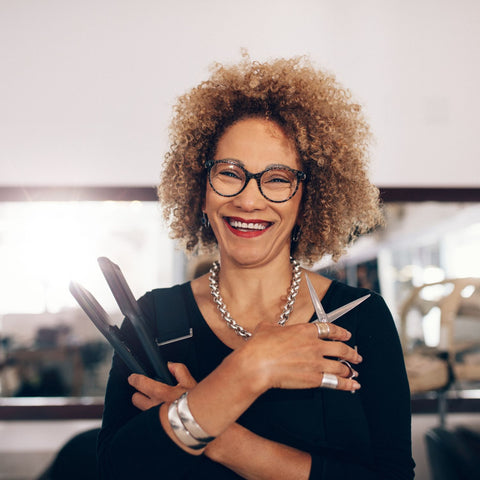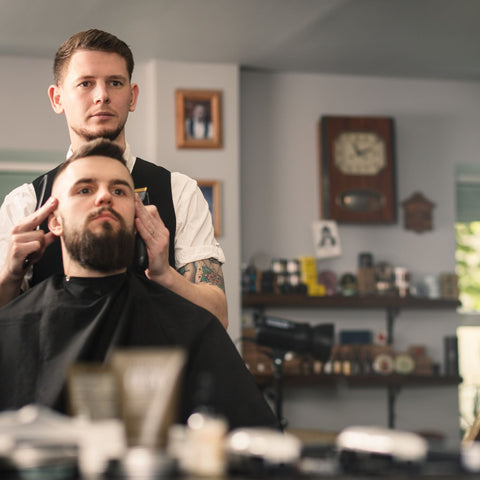In this question and answer session, we will be speaking with an expert in the beauty industry. They will be sharing their knowledge and experience in the field of barbering, hairdressing, and hairstyling. They will be providing insight into the education and training required, the day-to-day work involved, and the skills and qualities necessary for success in the industry. They will also discuss the challenges and rewards of working in the beauty industry, as well as the job outlook and earning potential. Additionally, they will also share their perspective on how the beauty industry is evolving and offer advice to those considering a career in this field. Through this interview, we hope to provide valuable information to help young people make an informed decision about a career in the beauty industry.

Interviewer: What inspired you to choose a career in the beauty industry, and what do you enjoy most about your work?
Expert: I've always had a passion for hair and makeup since I was a teenager, and I knew I wanted to make a career out of it. I enjoy the creativity that comes with being a hairstylist, and I love the feeling of making people look and feel their best. It's always a great feeling to see a client leave my chair feeling confident and happy with their new look. What I also enjoy about this career is that it's always changing and evolving, it keeps things interesting and challenging. Plus, working with different people every day and hearing their stories is always exciting.
Interviewer: Can you describe the education and training required to become a barber, hairdresser, or hairstylist?
Expert: The education and training required to become a barber, hairdresser, and hairstylist can vary depending on the location and type of establishment. However, in general, to become a barber, you typically need to attend a barber school, which typically takes about 9 months to 2 years to complete. You'll learn traditional barbering techniques, such as cutting men's hair, shaving, and providing basic hair care services. In addition to completing a training program, barbers must also pass a state licensing exam.
Becoming a hairdresser typically requires attending a cosmetology school, which typically takes 9 months to 2 years to complete. You'll learn a wide range of hair care services, including cutting, styling, coloring, and chemical treatments such as perms and relaxers. In addition to completing a training program, hairdressers must also pass a state licensing exam.
As for hairstylist, it's a general term that can refer to both barbers and hairdressers. A hairstylist will typically attend either a barber or cosmetology school and will learn the same techniques as a Barber or Hairdresser.
Interviewer: What are some of the differences between the day-to-day work of a barber, hairdresser, and hairstylist?
Expert: The main difference between the day-to-day work of a barber, hairdresser, and hairstylist is their focus of the service they offer. Barbers focus mainly on men's hair cutting, grooming, and shaving. They may also provide basic hair care services such as shampooing and styling. Hairdressers, on the other hand, provide a wider range of hair care services, including cutting, styling, coloring, and chemical treatments such as perms and relaxers. They also work with both men and women. As for hairstylist, as I mentioned before, it's a general term that can refer to both barbers and hairdressers. They may have a more diverse range of services and a client base, and can work with both men and women.
Interviewer: What are some of the essential tools and equipment required to perform the job of a barber, hairdresser, or hairstylist?
Expert: The essential tools and equipment required to perform the job of a barber, hairdresser, or hairstylist include scissors, combs, brushes, clippers, razors, and hair dryers. Depending on the services offered, additional tools may be required such as hair extension equipment, hair coloring supplies, and perm and relaxer kits. It's also important to have basic salon equipment such as styling chairs, mirrors, and shampoo bowls.
Interviewer: How much does it typically cost to purchase the basic tools and equipment needed to start a career in the beauty industry?
Expert: The cost of purchasing the basic tools and equipment needed to start a career in the beauty industry can vary depending on the quality and brand of the items. A basic set of scissors, combs, brushes, clippers, razors, and hair dryers can cost anywhere from $500 to $2000. Additionally, salon equipment such as styling chairs, mirrors, and shampoo bowls can cost anywhere from $1000 to $5000.
Interviewer: Are there any additional costs for specialized tools or equipment for different services such as hair extensions or chemical treatments?
Expert: Yes, there can be additional costs for specialized tools or equipment for different services such as hair extensions or chemical treatments. Hair extension equipment and supplies can cost anywhere from $500 to $5000, and hair coloring supplies can cost anywhere from $100 to $1000. Perm and relaxer kits can also cost anywhere from $50 to $200.
Interviewer: How do you maintain and care for your tools and equipment to ensure they last a long time?
Expert: Maintaining and caring for tools and equipment is important to ensure they last a long time. I make sure to clean and sterilize all tools and equipment after each use. I also make sure to properly store and protect my tools and equipment from damage. I also regularly inspect my tools and equipment to ensure they are in good working condition, and I replace any tools or equipment that are worn or damaged.
Interviewer: How do you stay current with the latest trends, styles, and techniques in the beauty industry?
Expert: Staying current with the latest trends, styles, and techniques is crucial in the beauty industry, and it requires constant learning and adaptation. I attend hair shows, workshops, and classes to learn about new techniques and products. I also follow industry influencers on social media and subscribe to beauty magazines to stay informed about the latest trends. I also make sure to practice these new techniques on my clients to stay proficient in them.
Interviewer: How do you build and maintain a client base, and what are some tips for building a successful career in the beauty industry?
Expert: Building and maintaining a client base is essential for success in the beauty industry. It's important to provide excellent customer service and to always go above and beyond for your clients. I make sure to keep their preferences and past experiences in mind, and I also follow up with them after their appointments to ensure that they are satisfied with their service. I also use social media to showcase my work and to connect with potential clients. Some tips for building a successful career in the beauty industry would be to continuously educate yourself, be open to learning new techniques, and to build a strong portfolio. Building a strong reputation in the industry is also important.
Interviewer: What are some of the challenges you face in your work, and how do you overcome them?
Expert: One of the challenges I face in my work is dealing with difficult clients. I try to remain calm and professional and to listen to their concerns. I also try to find a solution that will make them happy while still maintaining my professional standards. Another challenge is dealing with the physical demands of the job, such as being on my feet for long periods, and I make sure to take breaks and to practice self-care to prevent burnout. Time management is also a big challenge, and I make sure to schedule my appointments efficiently to minimize wait times for clients.
Interviewer: What are some of the benefits and drawbacks of working in the beauty industry?
Expert: Some benefits of working in the beauty industry include the creativity it allows, the ability to make people feel good about themselves, and the opportunity to work with a diverse group of people. Additionally, many people find the work to be very fulfilling, and there is always room for growth and advancement. However, some drawbacks of working in the beauty industry include the physical demands of the job, the stress that can come with managing a busy schedule, and the emotional toll that can come with dealing with difficult clients.
Interviewer: Can you describe the job outlook and earning potential for barbers, hairdressers, and hairstylists?
Expert: The job outlook for barbers, hairdressers, and hairstylists is generally positive. According to the Bureau of Labor Statistics, employment of hairdressers, hairstylists, and cosmetologists is projected to grow 8 percent from 2020 to 2030, about as fast as the average for all occupations. The earning potential for these professions can vary depending on location, experience, and level of expertise. According to the Bureau of Labor Statistics, the median annual wage for hairdressers, hairstylists, and cosmetologists was $25,970 in May 2020. The lowest 10 percent earned less than $19,640, and the highest 10 percent earned more than $52,040.
Interviewer: Can you tell me about any specialized areas of the beauty industry you are interested in?
Expert: I am particularly interested in the area of hair extensions and color. I love the idea of being able to completely transform someone's look and make them feel like a new person. I have taken multiple classes and workshops in this area and I have been practicing for a while now, I find it very exciting and fun to do.
Interviewer: How do you balance the creative and technical aspects of your work?
Expert: Balancing the creative and technical aspects of my work can be challenging at times. I make sure to stay up to date with the latest techniques and trends, but also to trust my instincts and to let my creativity flow. I also make sure to communicate with my clients to understand their preferences and to make sure that the final result is something that they will be happy with.
Interviewer: What is the most rewarding aspect of your job?
Expert: The most rewarding aspect of my job is seeing the positive impact that my work can have on people. When a client leaves my chair feeling confident and happy with their new look, it's truly a fulfilling feeling. I also enjoy the creativity of the job and the ability to express myself through my work.
Interviewer: How do you see the beauty industry evolving in the future?
Expert: I see the beauty industry continuing to evolve and adapt to new technologies and trends. I think that there will be an increasing emphasis on natural and organic products, as well as on sustainable practices. I also see virtual consultations and online booking becoming more prevalent, as well as more focus on virtual learning and training.
Interviewer: Can you give any advice to someone considering a career in the beauty industry?
Expert: My advice for someone considering a career in the beauty industry would be to never stop learning. The industry is always changing and evolving, so it's important to stay current with the latest techniques and trends. Additionally, it's important to build a strong portfolio and to network as much as possible. It's also important to be open to learning from others and to always be willing to try new things. And most importantly, stay passionate about it, it will make all the difference in your work. Another important piece of advice is to be prepared for the physical and emotional demands of the job, and to practice self-care to prevent burnout. Finally, it's important to have good communication skills, customer service and time management to be successful in this career.

In this question and answer session, we spoke with an expert in the beauty industry who shared their knowledge and experience in the fields of barbering, hairdressing, and hairstyling. They provided detailed information on the education and training required, the day-to-day work involved, and the skills and qualities necessary for success in the industry. They also discussed the challenges and rewards of working in the beauty industry, as well as the job outlook and earning potential.
The expert highlighted the importance of continuous education and staying current with the latest trends, styles, and techniques in the beauty industry. They also emphasized the importance of building and maintaining a client base, as well as the need for good communication skills, customer service, and time management. They also shared their perspective on how the beauty industry is evolving and offered advice to those considering a career in this field.
Overall, this expert provided valuable information that can help young people make an informed decision about a career in the beauty industry. They highlighted the creativity and self-expression that comes with being a hairstylist, hairdresser or barber. They also emphasized that it's important to be aware of the challenges and rewards, and to be prepared for the physical and emotional demands of the job, and to practice self-care to prevent burnout. With this information, young people will have a better understanding of the education, training, career and day-to-day work involved in the beauty industry, and will be able to make a more informed decision about pursuing a career in this field. Additionally, the expert's advice and perspective on the industry's future developments can be helpful for those considering a career in the beauty industry to make a well-informed decision about the direction they want to take and the skills they want to develop.
In conclusion, this question and answer session provided a comprehensive overview of the beauty industry and the different career options within it. It was clear from the expert's answers that a career in the beauty industry can be both challenging and rewarding, and it requires a combination of creativity, technical skills and good business acumen. With this information, young people can make an informed decision about pursuing a career in the beauty industry, and take the steps necessary to achieve their goals.

